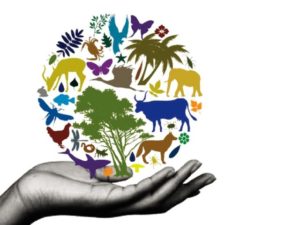by Haruna Ishikawa
 Biodiversity loss is one of the main environmental issues today. Biodiversity is the existence of a wide variety of plant and animal species in a natural environment. It means complex and various ecosystems. Today, it is said that the number of species on the earth is about 20 million. However, biodiversity has been lost because of the deterioration of the environment and because of adverse human activities. According to the Convention on Biological Diversity, a quarter of the species of plants is endangered (9). Also, from 1970 to 2006, the number of vertebrate animals decreased to one-fourth (24). There are 3 main causes of biodiversity loss: habitat loss, newly introduced species, and global warming. These have devastating effects on human life, so the world is trying to change the attitude toward biodiversity.
Biodiversity loss is one of the main environmental issues today. Biodiversity is the existence of a wide variety of plant and animal species in a natural environment. It means complex and various ecosystems. Today, it is said that the number of species on the earth is about 20 million. However, biodiversity has been lost because of the deterioration of the environment and because of adverse human activities. According to the Convention on Biological Diversity, a quarter of the species of plants is endangered (9). Also, from 1970 to 2006, the number of vertebrate animals decreased to one-fourth (24). There are 3 main causes of biodiversity loss: habitat loss, newly introduced species, and global warming. These have devastating effects on human life, so the world is trying to change the attitude toward biodiversity.
The major causes of biodiversity loss are made by human activities. The first cause is habitat loss. People cut down or burn a lot of trees to build roads and buildings and to create commercial items, such as papers and furniture. However, many animals and plants live in the forests, so their habitats are lost as a result of deforestation. Deforestation causes species extinction. Also, newly introduced species have a harmful influence on biodiversity. They are introduced as pets, foods and gardening by human activities. Because the introduced species eat the native species, the original ecosystem is broken. In addition, biodiversity loss is increased by another environmental issue: global warming. Global warming influences biodiversity greatly. It is reported that if the average temperature goes up more than 4 degrees, more than 40% of the species will become extinct. In short, these human activities make biodiversity loss worse (“Climate Change 2007â€).
Although human life is influenced by biodiversity loss. Biodiversity may not seem very important for humans, but human life is helped by biodiversity in various areas. For example, especially, in rural and developing countries, people use woods as energy for cooking and heating. According to the Millennium Ecosystem Assessment, in some African countries, such as Tanzania, Uganda, and Rwanda, wood fuel accounts for 80% of total energy consumption (31). Biodiversity loss will reduce the amount of wood and the various availabilities for many people. Moreover, it is possible that biodiversity loss causes natural disasters. Coral reefs and mangrove forest provide barriers against storms and floods. Also, trees in the forest prevent mudslides. Because of this loss of plants, human life and industrial agricultures could suffer from many serious consequences.
In recent years, the world has been making efforts to stop biodiversity loss. In 1992, the Convention on Biological Diversity was concluded and now, 168 countries have signed it. This is a treaty for protecting biodiversity. In 2010, 10th Conference of the Parties (COP10) was held in Aichi, Japan. The conference adopted the 2011-2020 Strategic Plan for Biodiversity, including the Aichi Biodiversity Targets. These are 3 examples of 20 Aichi Biodiversity Targets: decreasing he rate of loss of natural habitats by at least half, protecting 17% of terrestrial areas and 10% of marine areas as protected areas, and controlling and removing the introduced species. For the achievement of these targets, it is important for people in the world to pay attention to biodiversity.
In conclusion, as stated above, biodiversity and human life are closely connected. Biodiversity loss influences people all over the world, but many people are not aware that people are responsible for biodiversity loss. Recently, concerned scientists have gradually increased efforts to keep biodiversity, such as concluding treaties and holding conferences. However, the most important thing is that people learn more about the present situation of biodiversity and that each person make an effort to stop biodiversity loss.
Further Reading
Convention on Biological Diversity. Global Biodiversity Outlook 3. 10 May. 2010.
Intergovernmental Panel on Climate Change (IPCC). “Climate Change 2007†IPCC Fourth Assessment Report. 2007.
Millennium Ecosystem Assessment. Ecosystems and Human Well-being. 2005.
